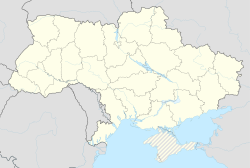L'vov
|
Lviv Львів |
|||||
|---|---|---|---|---|---|
| City of regional significance | |||||

View of the Market Square
|
|||||
|
|||||
| Motto(s): Semper fidelis | |||||
| Coordinates: 49°49′48″N 24°00′51″E / 49.83000°N 24.01417°ECoordinates: 49°49′48″N 24°00′51″E / 49.83000°N 24.01417°E | |||||
| Country | Ukraine | ||||
| Oblast | Lviv Oblast | ||||
| Municipality | Lviv | ||||
| Founded | 1240–1247 | ||||
| Magdeburg law | 1356 | ||||
| Government | |||||
| • Mayor | Andriy Sadovyi | ||||
| Area | |||||
| • Total | 182.01 km2 (70.27 sq mi) | ||||
| Elevation | 296 m (971 ft) | ||||
| Population (2017) | |||||
| • Total | 727,968 | ||||
| • Density | 4,008/km2 (10,380/sq mi) | ||||
| • Demonym | Leopolitan | ||||
| Time zone | EET (UTC+2) | ||||
| • Summer (DST) | EEST (UTC+3) | ||||
| Postal codes | 79000–79490 | ||||
| Area code(s) | +380 32(2) | ||||
| Licence plate | BC (before 2004: ТА, ТВ, ТН, ТС) | ||||
| Sister cities | Corning, Freiburg, Grozny, Kraków, Lublin, Novi Sad, Przemyśl, Saint Petersburg, Whitstable, Winnipeg, Wolfsburg, Rochdale | ||||
| Website | city-adm |
||||
| Year | Poles | % | Total |
|---|---|---|---|
| 1921 | 112,000 | 51 | 219,400 |
| 1989 | 9,500 | 1.2 | 790,908 |
| 2001 | 6,400 | 0.9 | 725,200 |
| UNESCO World Heritage Site | |
|---|---|

Town view from The High Castle
|
|
| Criteria | Cultural: ii, v |
| Reference | 865 |
| Inscription | 1998 (22nd Session) |
| Area | 120 ha |
| Buffer zone | 2,441 ha |
Lviv (Ukrainian: Львів [lʲʋiu̯] (![]() listen); Russian: Львов Lvov; Polish: Lwów [lvuf] (
listen); Russian: Львов Lvov; Polish: Lwów [lvuf] (![]() listen); German: Lemberg; see also other names) is the largest city in western Ukraine and the seventh-largest city in the country overall, with a population of around 728,350 as of 2016. Lviv is one of the main cultural centres of Ukraine.
listen); German: Lemberg; see also other names) is the largest city in western Ukraine and the seventh-largest city in the country overall, with a population of around 728,350 as of 2016. Lviv is one of the main cultural centres of Ukraine.
Named in honor of Leo, the eldest son of Daniel, King of Ruthenia, it was the capital of the Kingdom of Galicia–Volhynia (also called Kingdom of Rus') from 1272 to 1349, when it was conquered by King Casimir III the Great who then became known as the King of Poland and Rus'. From 1434, it was the regional capital of the Ruthenian Voivodeship in the Kingdom of Poland. In 1772, after the First Partition of Poland, the city became the capital of the Habsburg Kingdom of Galicia and Lodomeria. In 1918, for a short time, it was the capital of the West Ukrainian People's Republic. Between the wars, the city was the centre of the Lwów Voivodeship in the Second Polish Republic.
...
Wikipedia




